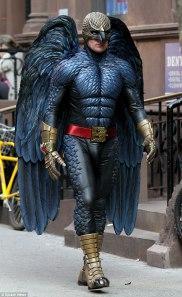There are around 30 superhero comic book movies scheduled to come out between now and 2020, at least 6 per year starting in 2016. It is worth noting that someone like Warner Bros., who will be responsible for one-third of all superhero movies going forward, is currently only committing to putting out 2 per year and has fully embraced year-round scheduling for tentpole releases. That means that not all of these dang movies are going to come out in the summer. Still, at least 6 a year, as many as 8 in certain years, seems like a lot. Plus, the more we hear about some of these movies the more it seems like a lot of them are being converted into Avengers-esque team-ups, e.g., Iron Man reportedly joining Captain America 3 for a mini-Avengers situation. Heck, the team-up angle isn’t even exclusive to the heroes since there are at least 2 planned releases (Sinister Six, Suicide Squad) which will try to turn teams of bad guys into anti-heroes. That’s just looking at the movies. On the TV side of things, there will soon be 8 different comic book shows on air with nearly 20 more on the way, although many of those will likely never make it through Hollywood’s arduous development process.
You can look at all of that a number of different ways. From a bottom line standpoint, is it actually good for business? Hollywood subsists on taking something we like, replicating it ad nauseam, and shoving it down our throats until we’re sick of it. So, will they have finally made us sick of comic books by 2020? From a fan perspective, you must feel as if you’ve died and gone to Valhalla. Good Lord, look at all the potentially amazing movies coming our way! We’re finally getting everything we always wanted, dream character pairings (Batman and Superman! Iron Man and Captain America!), more racial diversity (an African-American lead in Cyborg, potentially in Green Lantern, and maybe Will Smith in the ensemble of Suicide Squad!), actual female-led stories (definitely Wonder Woman, potentially Ms. Marvel and Black Cat), fan-adored comics storylines coming to film (Marvel’s “Civil War”), and the insane albeit remote possibility of Spider-Man showing up in an Avengers sequel. From a slightly more academic-leading angle, this is simply further confirmation that comic books are the Greek mythology of the modern era.
Birdman director Alejandro G. Inarritu disagrees. He cast Michael Keaton, one of the godfathers of the super hero film, to play the very meta part of an actor most known for having starred in a world-famous superhero movie centered around a character whose crime fighting moniker began with a “B” and ended with “man.” Of course, in this case it wasn’t Batman but Birdman, an orthnilogical hero created for the film.

Just so we’re clear, this is the Birdman from the film Birdman. We’re not talking about Harvey Birdman: Attorney At Law.
Now on the extreme downside of his career, Keaton’s character attempts to stage a comeback by producing and starring in an adaptation of Raymond Carver‘s play What We Talk About When We Talk About Love on Broadway. Joining Keaton in the cast of this buzzy, potential awards contender is Edward Norton and Emma Stone. So, in Inarritu’s film which skewers Hollywood’s superhero fixation you have the man (Keaton) who played Batman twice, the guy (Norton) who was one-and-done as The Incredible Hulk, and the girl (Stone) who was Spider-Man’s love interest for two movies. However, just because they were in those kinds of films doesn’t mean they actually like all of them. Keaton has admitted he’s never watched any of the Nolan Batman films all the way through because he has “zero interest in those kinds of movies,” Norton outed himself as someone who prefers his comic book movies ultra grim and serious, and Emma Stone…well, she knows not to bite the hand that feeds her. Come on, her real life boyfriend (Andrew Garfield) is still Spider-Man, perhaps not for much longer, based on rumors, but as of right now he’s still our friendly, neighborhood Spider-Man.

And we already know that Robert Downey, Jr. thinks the comic book movie fad is starting to fray around the edges a bit, or he just threw that out there as part of hardball contract negotiating with Marvel
Alejandro Inarritu is coming at all of this from a different angle, having spent most of his career scraping by on the type of low-to-mid-range budget fare Hollywood used to embrace, although, damn are his films bleak (21 Grams, Babel, Biutiful). Birdman is his first stab at comedy, albeit jet black comedy, but in an interview with Deadline he revealed it was not actually his first encounter with the super hero genre.
 After having become the first Mexican filmmaker to receive an Academy Award nomination for Best Director for Babel in 2006, Inarritu was indeed offered the chance to take a big budget comic book movie. He said no, and would so again because he’s unwilling to sacrifice 2 or more years of his life just to be the general of the small army involved in the making of such a film. Plus, he thinks our superhero fixation is “poison, cultural genocide”:
After having become the first Mexican filmmaker to receive an Academy Award nomination for Best Director for Babel in 2006, Inarritu was indeed offered the chance to take a big budget comic book movie. He said no, and would so again because he’s unwilling to sacrifice 2 or more years of his life just to be the general of the small army involved in the making of such a film. Plus, he thinks our superhero fixation is “poison, cultural genocide”:
“I think there’s nothing wrong with being fixated on superheroes when you are 7 years old, but I think there’s a disease in not growing up.”
That is the standard put-down of superheroes, e.g., “It’s kid’s stuff,” but that last part does ring somewhat true to me at least in the sense that in Hollywood’s perpetual quest for the increasingly fickle young male audience they have an invested interest in keeping all of us from growing up. The frustration Inarritu later voiced over what superhero films and the like have meant to films budgets also rings true, recounting how he can make a movie for $20 million and get $80 million back but that’s not enough for financiers and studios who’d rather make a big budget movie and bring back $800 million to $1 billion in ticket sales alone.
When asked whether or not he gets any enjoyment out of superhero films, he had an interesting if potentially contentious response:
“I sometimes enjoy them because they are basic and simple and go well with popcorn. The problem is that sometimes they purport to be profound, based on some Greek mythological kind of things, and they are honesty very right wing.”
I’m just going to stop the quote right there to let you prepare your, “Damnit, I’m tired of this crap – The Dark Knight is not some veiled defense of the Bush Administration’s war on terror!” response. Back to the quote:
“I always see them as killing people because they do not believe in what you believe, or they are not being who you want them to be. I hate that, and don’t respond to those characters. They have been poison, this cultural genocide, because the audience is so overexposed to plot and explosions and shit that doesn’t mean nothing about the experience of being human […] It’s a false, misleading conception, the superhero. Then, the way they apply violence to it, it’s absolutely right wing. If you observe the mentality of most of those films, it’s really about people who are rich, who have power, who will do the good, who will kill the bad. Philosophically, I just don’t like them.”
Birdman’s co-screenwriter Alexander Dinelaris immediately backed up his director:
“Those [superhero] movies are so black and white. Whatever side of it you are on, Gaza is grey. Abortion is grey, and so is the death penalty. You can have a side and think that side is right, but the problem is when, whatever side you take, you’re either right or wrong. These movies tend to be myopic in their view of, this is right, this is wrong, the hero does this and the bad guys…it all comes down the manufacturing line and you know what is going to happen.”
If you think he’s right, doesn’t that make now the absolutely perfect time for Marvel to pursue some iteration of the “Civil War” storyline that turned hero against hero along ideological, conservative/liberal lines, giving us a story in which we will truly not know what’s going to happen? By this point, the actual comics have a rich history of exploring the moral grey areas of its characters, and maybe that hasn’t quite translated to the films yet as much as it could, at least not beyond The Dark Knight trilogy and Watchmen. The Marvel films are the fun ones, and the DC ones are the serious ones but there have been very few villains who stood out, which is partially why Loki became the breakout villain of the bunch. He’s not just the most fun but also the most sympathetic, his tale of woe elevated to Shakespearean tragedy. Otherwise, it has kind of been black-and-white, with even those initially sympathetic (all of Iron Man’s villains) ultimately becoming, “Clearly, the dude’s crazy!”
Ultimately, it’s probably not that big of a deal that a filmmaker most known for his bleak, critical darlings doesn’t care for superhero films. There are signs that the moral complexity he finds lacking in the genre could be on its way, but are superhero films bad for us? Do they prevent us from growing up? Or do they truly provide us with modern myths of heightened reality heroes battling colorful villains and, maybe eventually, each other? Isn’t someone perfectly capable of escaping into a superhero film one week and having their mind blown by an artier bit of cinema like David Fincher’s Gone Girl the next? Or are some people just always going to be philosophically opposed to the concept of superheroes, and there’s no use fussing over any of it? If so, this was probably a waste of 1600 worlds on my part, huh?
What do you think? Is there some truth in what the director and writer had to say? Or to heck with them, give us Captain America vs. Iron Man as soon as possible, please! To the comments with you!
Source: Deadline

